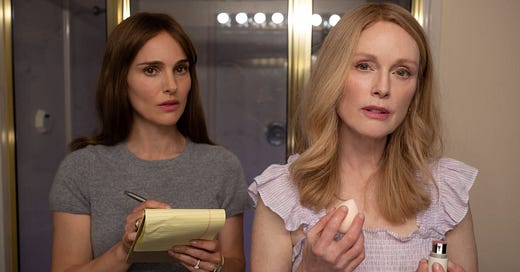May December (Todd Haynes, 2023)
May December announces its mixed messaging from its opening sequences. Blurred images of blossoming flowers and butterflies herald the self-awakening arc of Charles Melton’s character, Joe, while a dramatic piano score warns of something more sinister. Gracie (Julianne Moore) is confident and in control, a beloved member of her community, but she’s married to the man she groomed as a teenager and privately breaks down in tears over something as small as a canceled cake order. Natalie Portman’s Elizabeth is an actress playing Gracie in a movie and hoping to reveal deeper truths of her character, but she’s revealed to be a hack making a sappy direct to TV movie.
Director Todd Haynes works carefully with contrasts of tone and genre, relying mostly on a fairly austere style of dramatic cinematography with long takes and realistic performances, but punctuating them with melodramatic humor both through subtle jokes in dialogue and formally, through quick zooms and a deliberately overwrought score reorchestrated from the the 1971 film The Go-Between. As always, Haynes is deliberately referential in his style, but it’s more clear than ever here that he’s reworking his references to create something new and never
crafting a simple homage. May December recalls Bergman’s island films in its seaside locations and its small and intimate cast, and specifically references Persona’s blurring of two women’s personalities and Bergman’s use of theatrical direct address. On the opposite stylistic extreme, it also recalls soapy melodrama and Lifetime movies, both implicitly in its own form and explicitly through the show- and film-within-a-film.
Given these deliberate tonal contrasts, the ongoing debates about whether the film is comedy or tragedy, camp or serious drama are not surprising. It’s all of the above, but to see only one of these angles is to miss the film’s real work and its brilliance. Haynes (and screenwriter Samy Burch) put these dueling visions of character, genre, and tone into dialectical tension which structures the film and its themes. It’s a work about the images we construct of ourselves and others, and this dialectical form is used to prevent the audience from ever seeing only one thing or taking any of it at face value. Every bit of “truth” that is seemingly revealed through loud dramatic motions is simultaneously undermined as the characters wonder through a hall of mirrors that never denies the gravity of what’s at stake (rape, abuse, manipulation) but questions the possibility of any single and direct view of truth.
This skepticism is applied not just to human drama, where it continues Haynes’s longtime interest in the complex inner lives of women, but to his other ongoing obsession, the question of representation in general and in cinema specifically. Elizabeth is an actress adapting a tabloid story into a movie inside a movie which is itself an adaptation of a tabloid story, and the film also know and play with the fact that its audience can’t help but confuse the actress Natalie Portman with the actress Elizabeth whom she plays. Haynes holds these textual levels together with virtuosic skill, and uses them to develop the primary comedic through-line: nearly every scene with Elizabeth is on some level a joke about her method acting pretensions and how they lead her to try to become a pedophile and manipulate those around her without ever getting closer to actual profundity or truth. These include some of those impressive and tonally complex scenes of the year, which have an immediate and gut-wrenching dramatic impact followed (sometimes immediately or sometimes through call-backs in later scenes) by the realization that an important line or moment (“this is just what grown ups do”) doubles as a pedophilia joke.
May December is a serious drama about grooming and exploitation and the stories people construct to live with themselves, and it’s also a very dark (and very funny) commentary on the violence of cinematic representation. Like the images its characters develop of themselves and each other, film may reveal new angles and ideas, but inevitably at the cost of monstrous distortions. Elizabeth tells a class of drama students that she wants to show the complicated truth behind apparently bad people, but the film she lives in argues the naïveté of her idea. There’s no one, deep truth to be uncovered, but a series of reflections; it’s mirrors all the way down.




